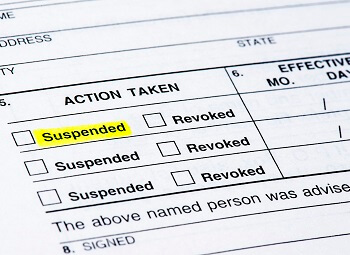
Unfortunately, if you have frequent problems behind the wheel, then you are likely to demonstrate to the authorities that you cannot be trusted with the privilege of driving. They might suspend, restrict or revoke your license as a result, and when they do, you could face several penalties, including increased auto insurance rates.
License restrictions are some of the clearest signals to insurers that you are a high-risk vehicle operator, and you don’t want them to see these on your record. The results could mean countless challenges, even the termination of your coverage. Here’s why.
How Do License Suspensions Work?
As you begin to accumulate black marks on your record, your freedom and autonomy as a driver might have to be restricted by the authorities, in the interest of safety. Several types of restrictions exist:
- A will place limits on how the driver can operate. For example, they might be limited to driving only to work, school and on essential errands. They might also be limited in how far they can travel from home.
- A suspension is the temporary loss of your ability to drive. While your license is suspended, it is still active, but you are not allowed to drive. Depending on local laws, you will have to take several steps to reinstate your license.
- A revocation is a permanent loss of your driving privileges and termination of your license. It often lasts indefinitely. To reinstate a revoked license, you will have to get the permissions of the authorities, and will usually have to reapply for a license from step one.
Numerous driving infractions might lead to restrictions, suspensions or revocations, including:
- Severe or frequent at-fault accidents
- Hit-and-run offenses
- Multiple speeding or reckless driving tickets
- DUIs
- Driving a car while committing another crime
Your auto insurer will find out about this suspension when they next review your driving record. In some cases, you are required to notify them yourself, too. However, just because you might not be allowed to drive, that does not mean you can cancel your auto insurance. Unless you plan to give up driving completely, you must continue to maintain this coverage.
The Effect of License Restrictions on Insurance Rates
When your auto insurer finds out that your license has been suspended or restricted, they will immediately deduce that you have a higher likelihood of having wrecks, breaking the law, and causing problems for others when you are behind the wheel.
This added risk equals a higher chance of you having to make claims on your auto policy, which your insurer might have to pay. As a result, the insurer will likely label you as a high-risk driver. Some will increase your premium, while others might cancel your coverage altogether.
All in all, a license suspension is likely going to cause more than its fair share of costly headaches, which is why you should strive to always keep your license active and unrestricted. You’ll be able to hit the road freely and without facing unaffordable insurance costs.
Also Read: How Do You Know When a Car is Totaled?
Get Started